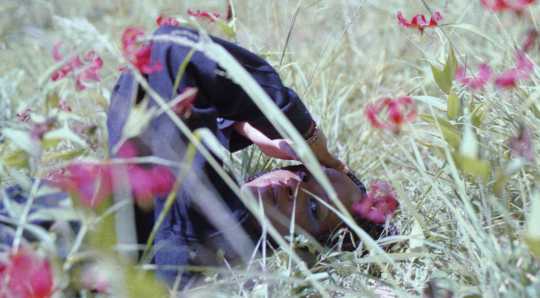|
How do especially creative artists consistently come up with original, meaningful works that advance new avenues in sound, discovery and pleasure to their listeners? Nyokabi Kariũki has given us a highly personalized answer to that question in peace places: kenyan memories. While sitting out Covid in the US, she brought to her personal sensibilities and memories of her family, her friends, and the landscape of her beloved home, Kenya to compose this unusual offering.
In this EP of 6 works lasting just under half an hour, Kariũki takes us down a path through the sound images that haven’t left her; rather they have been informed and transformed by her artistic growth and by the vividness, as well as the fickleness, of memory. Hers is a twenty-first century African interpretation of the environment and its relationship to traditional music. It differs from field recordings made mostly by Europeans, who paid not enough heed to the backdrop, both human and ambient, as they failed to capture fully how integral these elements are to the scope of the music.
Sonically, she teases us gently with console-tweaked natural sounds and with electronic fabrications. We share with her an intimate passage, one in which we feel, at the same time, enclosed within her secrets, while free and softly swathed under a crystalline light. For the most part, the song poems slip from one to the next, making peace places less an album of songs than an ongoing story of life.

|
|
We’re pleasantly jolted by the novelty and loveliness of “Equator Song” as it opens the EP’s samples of sound. Kariuki is reciting, in a deep voice, what seem like random words in multiple tongues; these are overriden by the additional language of noisy, busily chirping birds, and by a melodic electronic female voice that interweaves with the flapping, chattering birds. We’ll hear this voice again, like a streamer wafting through the album. It’s eerie to an extent, yet grand, almost operatic, and fluid. Both birds and voice rise and fall throughout “Equator Song,” while Kariũki’s spoken words remain unenhanced and earthbound. Finally, in the background we hear a voice, perhaps that of a neighbor or an ancestor, definitively delivering Kariuki back home.

|
|
She takes the path with her grandmother in “A Walk Through My Cũcũ's Farm.” A deadened piano note suggesting a footstep introduces the piece. It’s followed by what seems an interminable stillness, finally resuming with bare electronic notes that remind one of attenuated human voices, or a jaw harp, perhaps. There is minimal sound here, but much to reflect on as the breaks continue; finally we come upon a lovely pastoral passage, with birds chattering and dried undergrowth being crunched under heavy feet.
Kariũki’s voice enters, conversational, although we, at least I, are not privy to the language. Cucu appears now, her voice gently cracking with age. As the two women converse in familiar, everyday emphasis and tones, flutey bird sounds punctuate their lines. We see them walk on, crackling the undergrowth all the while. As her grandmother recedes, Kariũki continues to speak. One feels that she is revisiting some of her deepest, most tender, evocative memories. The volume builds, and the reunion of sound and souls ends with a balafon-like Gyil’s traditional woodsy notes, reminding us that we are in Africa. “A Walk Through Cucu’s Farm” is peace places’ most affecting offering, as we are deeply, softly being welcomed to share the nostalgia of its creator.

|
|
“Ngrumo, Feeding Goats Mangos” offers up an animated cartoon of barnyard sounds. We hear a goat’s bell anchoring the piece in an easily rising and falling cadence; what sounds like a a muffled quijada (a donkey jawbone as heard in Afro-Peruvian music) or maybe a donkey blubbering through their blubbery lips; and the same wafting female voice heard in “Equator Song.” I love when this voice appears, as if from a choir, solemn, counterpointing the donkey antics and other assorted sounds as they are introduced. Some are uttered from the wide repertory of goatspeech, along with people conversing and high-pitched whistled sounds, more pleasant than disquieting. “…Feeding Mangos” is quirky, but everything fits, joined by the comfort of peoples’ voices, and that high, proud, electronic wavering that she uses throughout the EP. In its homespun way, “…Feeding Goats Mangos” is the most dynamic piece of her soundscape.

|
|
Something felt out of step to me in “Naila’s Place,” disturbing the ease with which one vignette flows to the next in the prior songs, although the sounds, all electronic until we hear a woman’s voice briefly in English, are basically the same. It has a haunting quality, but is not as uplifting as the other songs. It’s always intriguing, yet feels detached and solitary. I learned later from the notes that “Naila’s Place” represents Kariũki’s reunion in the States with an old friend, a felicitous event, but seemingly one in contrast to the idyll of Kenya.
In peace places: kenyan memories, Nyokabi Kariũki has succeeded in conveying her very personal, even palpable memories, the sounds of which compel us to them. Each one is as a language that we may not be able to interpret, but we understand. In this charming, idiosyncratic work, she is offering to communicate intimately with us. And with herself.
Find the artist online.
|
